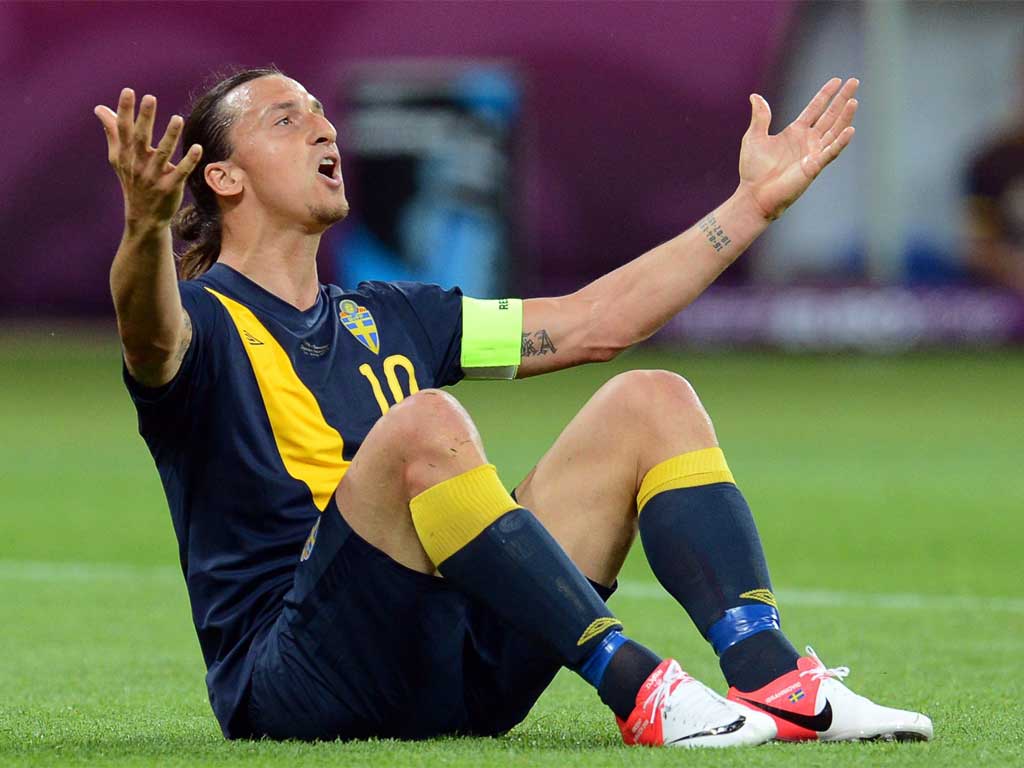Swedish focus on Zlatan Ibrahimovic will leave gaps for England

Your support helps us to tell the story
From reproductive rights to climate change to Big Tech, The Independent is on the ground when the story is developing. Whether it's investigating the financials of Elon Musk's pro-Trump PAC or producing our latest documentary, 'The A Word', which shines a light on the American women fighting for reproductive rights, we know how important it is to parse out the facts from the messaging.
At such a critical moment in US history, we need reporters on the ground. Your donation allows us to keep sending journalists to speak to both sides of the story.
The Independent is trusted by Americans across the entire political spectrum. And unlike many other quality news outlets, we choose not to lock Americans out of our reporting and analysis with paywalls. We believe quality journalism should be available to everyone, paid for by those who can afford it.
Your support makes all the difference.The 21st minute of a game Sweden were destined to lose. Zlatan Ibrahimovic, from his deep-lying starting point, sets off on a brisk counter attack. He has two Ukrainian defenders ahead of him and Markus Rosenberg to his left. As one, the pub I watched the game in cried ‘give it’. A simple throughball would split the central defensive pairing in two and set the striker free to bear down on goal.
Instead, the sometimes-genius, sometimes-ignoramus talisman went alone. And alone down a blind alley, the moment lost. It epitomised Sweden’s tournament football since the AC Milan man really came to prominence.
Ibrahimovic was said to be exasperated with ‘unprofessional’ team-mates following the 2-1 defeat in Kiev after watching a number of them waving to family during a warm down. He demands the best, total concentration on the job, and there is also a school of thought that the mercurial talent simply does not trust those around him at international level. What other sane reason could there be not to slip Rosenberg in?
The Werder Bremen striker hasn’t managed to find the net for his country for five years. Zlatan has good reason not to believe.
The thing is, they believe in him, bordering on the chronically over-reliant. The formation that coach Erik Hamren employs is centred around getting the ball into a pocket of space between the front line and midfield as quickly as possible, affording Ibrahimovic time to work his magic. But when faced with a disciplined defensive midfielder, in Monday’s case Anatoliy Tymoshchuk and in this Friday's, Scott Parker, the ability to launch attacks is often stifled, with little in the way of a plan B.
Ibrahimovic had serious reservations at the omission of preferred front man Johan Elmander for fitness reasons, but problems run deeper than simply not picking the likeliest goalscoring threat.
Their game should revolve around the passing range of Kim Kallstrom and Anders Svensson, but the latter didn’t start against Ukraine as Hamren opted for the engine of Rasmus Elm. Rushing to hit the space occupied by Zlatan renders the passers somewhat obsolete as they have moved away from the functional, aesthetically-pleasing style synonymous with the reign of predecessor Lars Lagerback.
Elm has the handy knack of being able to hurl the ball a very long way, ala Rory Delap, meaning Joleon Lescott will need to perform as he did against France to repel the aerial threat of Anders Granqvist at throw-ins. If Seb Larsson is on set piece duties, extend that, because as any Premier League supporter will tell you, his delivery can be deadly.
But Roy Hodgson has numerous Swede holes in which to pick. It is hard to imagine that an ageing Olof Mellberg will not be sent for a strenuous run around the Olympic Stadium by a sprightly Danny Welbeck, for example. Mellberg’s defending also came into question earlier in the week – chastised for rocking on his heels for Andrei Shevchenko’s opening goal. Tactically, they were short too, with Ibrahimovic asked to mark Sheva from the corner resulting in the winning goal. Needless to say, it wasn’t pretty viewing.
Prying on Martin Olsson’s state of FLUSK (Familiarity of Losing Under Steve Kean), could also prove fruitful – the left-back was out of sorts in the opening game. Both he and Mikael Lustig looked reluctant to join in, never really venturing forward consistently to any great effect.
If Steven Gerrard plays at a tempo, England win. For a side who play 4-2-3-1, Sweden are strangely rigid and were caught square at the second ball breakdown on countless occasions against the co-hosts. The battle in midfield for that phase of play is key; bet against driving, Champions League night at Anfield-esque runs from the captain at your peril. Those line-breaking drives can yield goals and open the game up in the final third.
They’re also susceptible to genuine width. The midfield maintains a compact structure, despite the guise of a more expansive Swedish outfit, leaving England’s nippier wingers - the likes of Alex Oxlade-Chamberlain - with a relatively free run at the fullbacks.
Against Ukraine there was a lack of a holding midfielder, strange in the modern game. Funny, or galling if you happen to be Scandinavian, that the space Sweden tried to exploit via Zlatan is defensively the zone they neglected the most. And if they fail to introduce hardman Pontus Wernbloom, the same mistakes will be their undoing again.
Join our commenting forum
Join thought-provoking conversations, follow other Independent readers and see their replies
Comments